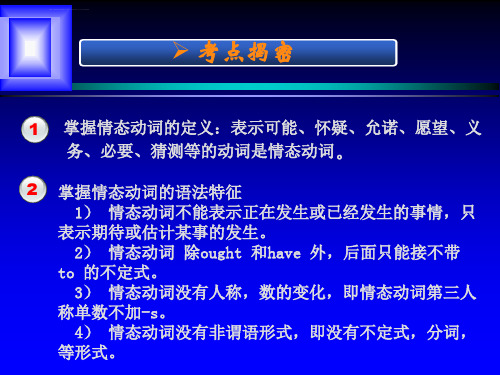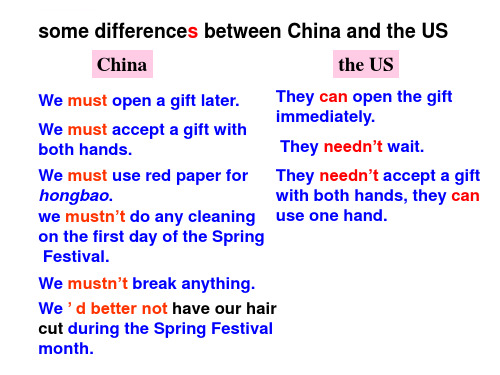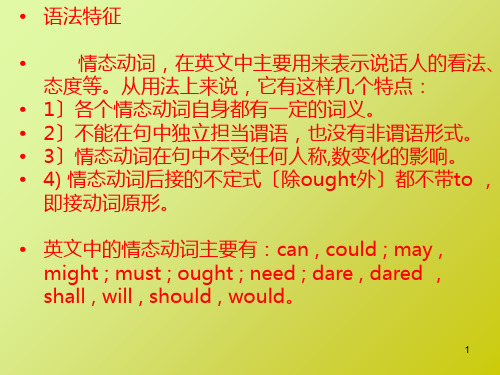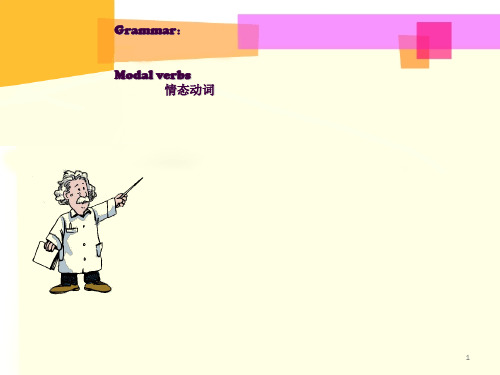(完整版)初中英语情态动词用法归纳课件
合集下载
情态动词(20张PPT)初中英语专项复习课件

看法。
(1)只作情态动词:must;can/could;may/might;ought to
(2)既可作情态动词又可作实义动词:need,dare
((34))既 具可 有作 情情 态态 动动词词某又些可特作征稿稿定助:定hPa动PPvTP,e词T/海h:量asd素ha材tlo持l;/s续hha更odublde;twteirll/would
【知识拓展】
1. must的一般疑问句,肯定回答为Yes, ...must.;否定回答为No, ...needn’t./No, ...don’t have
to.—Must I clean the classroom now? 我必须现在打扫教室吗?
—Yes, you must. 是的,你必须。/No, you don’t have to. /No, you needn’t. 不,你不必。
He promised he would never smoke again. 他承诺他再也不吸烟了。
Their English teacher would tell them stories in
表示过去反复发生的动 English after class.
作或某种倾向
他们的英语老师总是在课后用英语给他们讲故事
新,上千款模板选择总有一
款适合你
知识点二:情态动词的特点
情态动词的特点: (1)情态动词无人称和数的变化(have to除外); (2)情态动词后接动词原形; (3)情态动词的否定式是在其后加not; have to除外 (4)具有助动词的作用,可用来构成否定句、疑问句及用于简明答语; (5)个别情态动词有现在式和稿过定去PP式T两种形式,过去式用来表达更加客气、委 婉的语气,时态性不强,可稿用定于PPT过,海去量、素材现持在续更或将来。
(1)只作情态动词:must;can/could;may/might;ought to
(2)既可作情态动词又可作实义动词:need,dare
((34))既 具可 有作 情情 态态 动动词词某又些可特作征稿稿定助:定hPa动PPvTP,e词T/海h:量asd素ha材tlo持l;/s续hha更odublde;twteirll/would
【知识拓展】
1. must的一般疑问句,肯定回答为Yes, ...must.;否定回答为No, ...needn’t./No, ...don’t have
to.—Must I clean the classroom now? 我必须现在打扫教室吗?
—Yes, you must. 是的,你必须。/No, you don’t have to. /No, you needn’t. 不,你不必。
He promised he would never smoke again. 他承诺他再也不吸烟了。
Their English teacher would tell them stories in
表示过去反复发生的动 English after class.
作或某种倾向
他们的英语老师总是在课后用英语给他们讲故事
新,上千款模板选择总有一
款适合你
知识点二:情态动词的特点
情态动词的特点: (1)情态动词无人称和数的变化(have to除外); (2)情态动词后接动词原形; (3)情态动词的否定式是在其后加not; have to除外 (4)具有助动词的作用,可用来构成否定句、疑问句及用于简明答语; (5)个别情态动词有现在式和稿过定去PP式T两种形式,过去式用来表达更加客气、委 婉的语气,时态性不强,可稿用定于PPT过,海去量、素材现持在续更或将来。
情态动词用法归纳全

五、shall,.should-1shall用于第一人称,征求对方的意见。-What shall we d this evening?-2shall用于第二、三人称,表示说话人给对方的命令、警告、-允诺或威肋。.You shall fail if you don't work hard.警告-2.He shall ave the book when I finish it.允诺-3.He shall be punish d.威胁
情态动词用法归纳全情态动词用法归纳全PPT课件
can,could-1表示能力(体力、知识、技能)-Can you lift this heavy box ?体力-Mary can speak three languages.知识-Can you skate?技 -此时可用be able to代替。-Can只有一般现在时和一般过去式;而be able to则有-更多的 态。-I'll not be able to come this afternoon.-当表示“经过努力才 以做成功某事”时应用oe able-to,不能用Can。如:-He was able to go to t e party yesterday evening in-spite of the heavy rain.
-、can,could-3表示客观可能性(客观原因形成的能力。-They've changed the t metable,so we can go by bus-instead.-This hall can ho d 500 people at least-4表示推测(惊讶、怀疑、不相信的态度),用于疑问句、否定句和感 叹句中。-Can this be true?-This can't be done by him.-How can this be true?
情态动词讲解精ppt课件

例句
will/would
详细描述:will 表示现在的意愿或 预测,would 表示过去的或虚拟 的意愿或预测。
1. I will help you with your project.(我会帮助你完成你的项 目。)
总结词:表示意愿或预测
例句
2. They would have gone to the party if they had known about it earlier.(如果他们早点 知道,他们就会去参加聚会。)
表示意愿
情态动词+动词原形,如 would like to go,表示 某人想要去。
形式变化
基本形式
情态动词的基本形式包括 现在时、过去时和将来时 。
过去式
情态动词的过去式通常是 在基本形式后面加-d或ed,如could have done 、should have done等。
将来时
情态动词的将来时通常是 在基本形式后面加-will或shall,如will be able to 、shall have to等。
may与might的区别与联系
总结词
may表示现在的许可或可能性;might表示过去的可能性或许可。
详细描述
may用于肯定句中,表示许可或可能性,例如“You may use this room.”(你可以使用这个房间。 )“The book may be in the library.”(这本书可能在图书馆里。)might表示过去的可能性,常 用于过去时态的句子中,例如“He might come tomorrow.”(他明天可能来。)
未必、很难说
She might not agree with us.
表示虚拟语气
will/would
详细描述:will 表示现在的意愿或 预测,would 表示过去的或虚拟 的意愿或预测。
1. I will help you with your project.(我会帮助你完成你的项 目。)
总结词:表示意愿或预测
例句
2. They would have gone to the party if they had known about it earlier.(如果他们早点 知道,他们就会去参加聚会。)
表示意愿
情态动词+动词原形,如 would like to go,表示 某人想要去。
形式变化
基本形式
情态动词的基本形式包括 现在时、过去时和将来时 。
过去式
情态动词的过去式通常是 在基本形式后面加-d或ed,如could have done 、should have done等。
将来时
情态动词的将来时通常是 在基本形式后面加-will或shall,如will be able to 、shall have to等。
may与might的区别与联系
总结词
may表示现在的许可或可能性;might表示过去的可能性或许可。
详细描述
may用于肯定句中,表示许可或可能性,例如“You may use this room.”(你可以使用这个房间。 )“The book may be in the library.”(这本书可能在图书馆里。)might表示过去的可能性,常 用于过去时态的句子中,例如“He might come tomorrow.”(他明天可能来。)
未必、很难说
She might not agree with us.
表示虚拟语气
情态动词(17张PPT)初中英语专项复习课件

情态动词表推测也是每年中考的重点,以考查can’t 和must为主,主要在单项选择中考查不同情态动词的辨 析。考生在解答此类试题时,可以从以下几方面着手: ①表示否定的推测:一是断然的否定,此类题一般是考 查情态动词表推测的用法,语境会对所填空给出解释, 据 此 可 以 判 断 是 非 常 肯 定 的 否 定 , 此 时 最 好 用 cannot /can’t;二是表示不能十分肯定或拿不准,此类题一般 也会有相关的语境提示,如I’m not sure、who knows等 ,此时最好用may或might。
表示需要、必须,主 要用于否定句和疑问 句中。needn’t常用 于回答must表请求的 否定回答
—Must I finish my homework now?我必 须现在完成我的家庭作 业吗? —No, you needn’t. 不, 你不需要。
注意 (1) must和have/has to均意为“必须”,常可互 换使用。但have/has to是用于强调客观需要,意为 “必须, 不得不”;must用于表示主观看法, 意为“ 必须, 应该”。如:We’ll have to ask Zhang Hong. 我们必须去问张红了。 We must work hard at school. 在学校我们必须 努力学习。
情态动词本身有一定的意义,但不能独立作谓语, 没有人称和数的变化,后面必须接动词原形。常见的情 态动词有:may, must, need, have to 等,具体用法见下表 :
情态动词
用法
例句
表示能力,意为 Sam can speak English well.
can “能,会”
山姆英语讲得很好。
He could have gone home. 他可能已回家了。
表示需要、必须,主 要用于否定句和疑问 句中。needn’t常用 于回答must表请求的 否定回答
—Must I finish my homework now?我必 须现在完成我的家庭作 业吗? —No, you needn’t. 不, 你不需要。
注意 (1) must和have/has to均意为“必须”,常可互 换使用。但have/has to是用于强调客观需要,意为 “必须, 不得不”;must用于表示主观看法, 意为“ 必须, 应该”。如:We’ll have to ask Zhang Hong. 我们必须去问张红了。 We must work hard at school. 在学校我们必须 努力学习。
情态动词本身有一定的意义,但不能独立作谓语, 没有人称和数的变化,后面必须接动词原形。常见的情 态动词有:may, must, need, have to 等,具体用法见下表 :
情态动词
用法
例句
表示能力,意为 Sam can speak English well.
can “能,会”
山姆英语讲得很好。
He could have gone home. 他可能已回家了。
九年级英语情态动词知识点讲解PPT课件

reading room.
could 意为“很可能”,语气强于may
The story book could be Li Ping's.He likes reading stories.
must can
意为“必定,一定”,语气最 强烈
表可能性,时常用在疑问句中
The book must be Lucy's.Her name is on the cover.
A.can;may
B.must;have to
C.may;must
D.mustn't;must
【温馨提示】专题训练见《强化训练册》B53
—Yes,I can.
A.must
B.should
C.need
D.can
( B )7.(2019·孝感)—May I join the art club,Dad?
—If you have interest,you ________.
A.should
B.can
C.have to
D.must
( C )8.(2019·兰州)The magazine ________ Lucy's.We can see her name on the
—Where can my pen be?—It may be in your desk.
2.情态动词表示否定推测的用法 (1)can't 表示否定推测,语气强烈,意为“一定不;不可能”。如: That can't be Miss Gao.She has gone to Shanghai.那不可能是高老师。她 去上海了。 (2)may not 也表示否定推测,语气不确定,意为“可能不是”。如: It may not be my pen.这可能不是我的钢笔。
could 意为“很可能”,语气强于may
The story book could be Li Ping's.He likes reading stories.
must can
意为“必定,一定”,语气最 强烈
表可能性,时常用在疑问句中
The book must be Lucy's.Her name is on the cover.
A.can;may
B.must;have to
C.may;must
D.mustn't;must
【温馨提示】专题训练见《强化训练册》B53
—Yes,I can.
A.must
B.should
C.need
D.can
( B )7.(2019·孝感)—May I join the art club,Dad?
—If you have interest,you ________.
A.should
B.can
C.have to
D.must
( C )8.(2019·兰州)The magazine ________ Lucy's.We can see her name on the
—Where can my pen be?—It may be in your desk.
2.情态动词表示否定推测的用法 (1)can't 表示否定推测,语气强烈,意为“一定不;不可能”。如: That can't be Miss Gao.She has gone to Shanghai.那不可能是高老师。她 去上海了。 (2)may not 也表示否定推测,语气不确定,意为“可能不是”。如: It may not be my pen.这可能不是我的钢笔。
初中英语语法课件 几种情态动词的基本用法

Need I help you if you get into trouble?
EXERCISES
用适当的情态动词填空
needn’t
1. You
worry about me.
must 2. He looks so pale, he be ill.
3. Plants will die without sunshine.
3.must
表示“必须; 应该” We must finish our homework everyday.
表示“一定”
The book must belong to Jim , there is his name on the cover.
表示“硬要;偏要”
If you must go home, at least call your mom.
7. Students D tell lies. A. may not B. must C. can D. mustn`t
1. You A fail in the exam without hard working. A. will B. would C. mustn‘t D. can
2. He had to give up smoking because of his illness, C he? A. did B. does C. didn’t D. doesn‘t
2. may/might
表示请求、允许、许可, might比may的语气更委婉. 表示推测“可能”, could的可能性比can小。
—May I use the car ? —I’m afraid not. It might not be Jane. She hasn`t dicided to come here yet.
EXERCISES
用适当的情态动词填空
needn’t
1. You
worry about me.
must 2. He looks so pale, he be ill.
3. Plants will die without sunshine.
3.must
表示“必须; 应该” We must finish our homework everyday.
表示“一定”
The book must belong to Jim , there is his name on the cover.
表示“硬要;偏要”
If you must go home, at least call your mom.
7. Students D tell lies. A. may not B. must C. can D. mustn`t
1. You A fail in the exam without hard working. A. will B. would C. mustn‘t D. can
2. He had to give up smoking because of his illness, C he? A. did B. does C. didn’t D. doesn‘t
2. may/might
表示请求、允许、许可, might比may的语气更委婉. 表示推测“可能”, could的可能性比can小。
—May I use the car ? —I’m afraid not. It might not be Jane. She hasn`t dicided to come here yet.
七年级-情态动词ppt

can't have done 的语气比 couldn't have done 要强一些
以could或would提问时,不能再以 could或would作答,而应该用can或will。 如: —Could I borrow your dictionary? —Yes, of course you can.
2.表示“必须”这个意思时,must 和 have to 稍有区别。must着重说明主观 看法,have to 强调客观需要。另外, have to 能用于更多时态。
I don’t like this TV set. We must buy a new one. There was no more bus. They had to walk home.
只作情态动词的 can / could, may / might, ought to, must
可情态可实义的 need, dare 可情态可助动词的 shall / should, will /
would 相当于情态动词的 have to, used to
can 和could:
1) can的主要用法是: A. 表示体力或脑力的能力:
I’d like to…
would表示过去的习惯,后接动词原形,意 为“总是,总会” e.g. He would sit near the fire for hours on winter evenings. e.g. When I was a child, I would go swimming with other children in summer.
dropped it can’t/couldn’t have done: 用于否定句时表否定推断,推
以could或would提问时,不能再以 could或would作答,而应该用can或will。 如: —Could I borrow your dictionary? —Yes, of course you can.
2.表示“必须”这个意思时,must 和 have to 稍有区别。must着重说明主观 看法,have to 强调客观需要。另外, have to 能用于更多时态。
I don’t like this TV set. We must buy a new one. There was no more bus. They had to walk home.
只作情态动词的 can / could, may / might, ought to, must
可情态可实义的 need, dare 可情态可助动词的 shall / should, will /
would 相当于情态动词的 have to, used to
can 和could:
1) can的主要用法是: A. 表示体力或脑力的能力:
I’d like to…
would表示过去的习惯,后接动词原形,意 为“总是,总会” e.g. He would sit near the fire for hours on winter evenings. e.g. When I was a child, I would go swimming with other children in summer.
dropped it can’t/couldn’t have done: 用于否定句时表否定推断,推
初中英语情态动词课件ppt

寒假来临,不少的高中毕业生和大学 在校生 都选择 去打工 。准备 过一个 充实而 有意义 的寒假 。但是 ,目前 社会上 寒假招 工的陷 阱很多
➢ 重难点解析
4 比较may和might
表示允许或请求;表示没有把握的推测;may 放在句首, 表示祝愿。
May God bless you!
He might be at home.
寒假来临,不少的高中毕业生和大学 在校生 都选择 去打工 。准备 过一个 充实而 有意义 的寒假 。但是 ,目前 社会上 寒假招 工的陷 阱很多
➢ 考点揭密
2 may
may表示允许、也许,意为“可以,也许,可能”。对 may的一般问句的回答,肯定回答一般是:Yes, please./ Certainly./ Sure等,否定回答一般是:Please don't./No, you can't/mustn't. might是may的过去式,与may用法类似,常用于过去时 中;用在疑问句中,还可表示委婉客气。
寒假来临,不少的高中毕业生和大学 在校生 都选择 去打工 。准备 过一个 充实而 有意义 的寒假 。但是 ,目前 社会上 寒假招 工的陷 阱很多
➢ 考点揭密
1 掌握情态动词的定义:表示可能、怀疑、允诺、愿望、义
务、必要、猜测等的动词是情态动词。
2 掌握情态动词的语法特征 1) 情态动词不能表示正在发生或已经发生的事情,只
寒假来临,不少的高中毕业生和大学 在校生 都选择 去打工 。准备 过一个 充实而 有意义 的寒假 。但是 ,目前 社会上 寒假招 工的陷 阱很多
➢ 重难点解析
二者所强调的意思不同。一般来说,can强调客观上的可 能性,而may则强调主观上的推测或判断。如:
情态动词(12张PPT)初中英语专项复习课件

例句
可能性
The storybook could be Jim’s. He likes reading
小
could 很可能 stories.这本故事书很可能是吉姆的,他喜欢读故
事。
This book must be Lucy’s, for her name is on the must 一定 cover.这本书一定是露西的,因为封面上有她的名 大
态 动
had better 最好,用来提出建议
today.
词
情态动词的基本含义
分析近三年中考真题可知,情态动词的基本用法是中考必考点,考生需 掌握各个情态动词的基本含义(见"考点帮")。
在答题时,应注意结合语境,并考虑常见句型。 常考情态动词有can、may和must及情态动词的否定形式needn’t、
基 本 句
②可能,也许,表示推
They might laugh at me.
型
might 测
情
态 动 词
常 见 情
①必须,表示命令或主观 看法
—Must I finish the homework today? —No, you needn’t/don’t have to. He must be staying here.
基
①能,会,表示能力
I can sing.
本
②可能,表示推测,常用于否定句和疑 Can it be right?
句
问句
型
can ③可以,表示许可和征求对方意见
Can you help me?
情
①能,会,can的过去式,表 I could do it.
态
常
过去的能力
情态动词的用法(中学课件201909)

You can not leave here till I come back . 直到我回来你才能离开。
情态动词
1. 常用情态动词的基本用法 can , could 能,会 (could可以看作是can的过去式,这两个词除了时
态不相同外,在表达意思的许多方面是相同的。当 然could也有自己独特的用法。) 1)表示脑力或体力上的能力
Nobody can stop the development of science . 谁也无法阻止科学的发展。
2)表示客观上的可能性
You can borrow this useful book from the library . 你可以从图书馆借到这种有用的书 him for the job can not be found . 不可能找到比他更适合这份工作的人了。
She can sing that song in English.她能用英文唱那歌。
He could hardly support his family before he found the new job .他在找到那份新工作前几乎无 法养家。
I could not understand the lecture on the computer given by Mr. Smith .我听不懂史密斯先生作的那个关 于计算机的讲座。
Now people can skate on the lake . 现在人们可以在湖上滑冰了。
When the storm stopped , the plane could take off . 当风暴停下来时,飞机可以起飞了不得。 3)表示主观上的允许 Can I ask you some questions about it ? 我可以问你有关这件事的几个问题吗?
情态动词
1. 常用情态动词的基本用法 can , could 能,会 (could可以看作是can的过去式,这两个词除了时
态不相同外,在表达意思的许多方面是相同的。当 然could也有自己独特的用法。) 1)表示脑力或体力上的能力
Nobody can stop the development of science . 谁也无法阻止科学的发展。
2)表示客观上的可能性
You can borrow this useful book from the library . 你可以从图书馆借到这种有用的书 him for the job can not be found . 不可能找到比他更适合这份工作的人了。
She can sing that song in English.她能用英文唱那歌。
He could hardly support his family before he found the new job .他在找到那份新工作前几乎无 法养家。
I could not understand the lecture on the computer given by Mr. Smith .我听不懂史密斯先生作的那个关 于计算机的讲座。
Now people can skate on the lake . 现在人们可以在湖上滑冰了。
When the storm stopped , the plane could take off . 当风暴停下来时,飞机可以起飞了不得。 3)表示主观上的允许 Can I ask you some questions about it ? 我可以问你有关这件事的几个问题吗?
情态动词的用法PPT课件

“雪亮工程"是以区(县)、乡(镇) 、村( 社区) 三级综 治中心 为指挥 平台、 以综治 信息化 为支撑 、以网 格化管 理为基 础、以 公共安 全视频 监控联 网应用 为重点 的“群 众性治 安防控 工程” 。
Exercises:
My brother was very ill, so I ( had to) call the doctor in the middle of the night.
“雪亮工程"是以区(县)、乡(镇) 、村( 社区) 三级综 治中心 为指挥 平台、 以综治 信息化 为支撑 、以网 格化管 理为基 础、以 公共安 全视频 监控联 网应用 为重点 的“群 众性治 安防控 工程” 。
some differences between China and the US
China
3 Underline the correct words.
注意: might为may的过去式,但也可以代替may, 语气较为婉转客气或更加不肯定。
“雪亮工程"是以区(县)、乡(镇) 、村( 社区) 三级综 治中心 为指挥 平台、 以综治 信息化 为支撑 、以网 格化管 理为基 础、以 公共安 全视频 监控联 网应用 为重点 的“群 众性治 安防控 工程” 。
— For your health, I’m afraid you ______. (2011贵州安顺)
A. may B. can C. have to D. need
“雪亮工程"是以区(县)、乡(镇) 、村( 社区) 三级综 治中心 为指挥 平台、 以综治 信息化 为支撑 、以网 格化管 理为基 础、以 公共安 全视频 监控联 网应用 为重点 的“群 众性治 安防控 工程” 。
初中英语-情态动词-课件(共31张PPT)

二、情态动词的用法 4.dare和need
need “需要” dare“敢” 可作情态动词也可作实义动词
• (2)当实义动词使用时,有人称和时态的变化 • e.g.You don't need to do it yourself. • He did not dare(to) look up.
• ——Can you drive a car at present? • ——I_____ do so in the busy street.
• A.may not C.daren't
B.don't dare D.needn't
二、情态动词的用法 ed to和had better
• (1)used to表示过去的习惯动作或状态,现 已不存在。
• e.g.There used to be our playground.
二、情态动词的用法 ed to和had better
time. • I'll not be able to come this afternoon.
二、情态动词的用法
• (2)表客观可能性,在疑问句中表示请求或许可 • e.g.Man can not live without air. • Can I use your pen?
• *could是can的过去时,主要用于疑问句,表示语气委婉。 • 肯定回答用 • 否定回答可用
C.should tell
D.should have told
二、情态动词的用法 7.will和would
(1)表意愿,用于各种人称的陈述句。
• e.g.I will do anything for you. • If you will read the book,I'll lend it to you.
初中英语语法大全——情态动词(共25张PPT)

三. must的用法
1.表示必须 must表示必须多指现在或将来的情况,强调说话者的主观语气即说话者认 为有必要或有义务做某事。对其一般疑问句的肯同答用must,否定回答用 needn't或者don't have to。 Everyone must take notes carefully in Professor Liu’s class. Must I finish the work tonight ? ---Yes, you must. --- No, you needn’t /don't have to.
九、had better的用法
1. 表示劝告或建议 eg: You' d better eat these bananas before they go ba d. 2. had better的否定形式 其否定形式是将not直接放在had better的后面。 eg: You had better not miss the last bus.
3.表示请求或允许 (1)用could 比用can更加迟疑不决,当没有把握得到允许或需 要委婉表达时用could。 eg: Could I take this seat, sir, if you don't mind? eg: You can phone me after six this afternoon. 当允许别人做某事时,答语用cause your cell phone for a while? --- Yes, of course you can.
五. will/would的用法
1、表示意愿 表示自愿做或主动提出做建电如意志 愿望或决心等,可用于各种 人称。would是will的过去式。 eg: I won’t argue with you.我不愿意和你争辩。 eg: Jane said she would not go with Tom, for she didn’t like him. 简说她不愿和汤姆一起去,因为她不喜欢他。
情态动词用法课件

a rule of the hospital .〔客观〕
9
2) have to有人称、数、时态的变化,而must只有 一种形式。
He had to look after his sister yesterday.
3〕 在否认结构中: don't have to 表示"不必" mustn‘t 表示“禁止〞,
如:你现在可以走了Y。ou__m_a_y__g_o__n_o_w__._____________
表示没有把握的推测;〞或许,可能〞表示一件事 情或许会发生,只用在陈述句中。
如:他可能来,但我认为他不会来。 _____H__e_m__a_y__c_o_m__e_,_b_u_t_I__d_o_n_’_t _th__in_k__h_e__w_ill .
他不可能正在等你。 _H__e__c_a_n__’t__b_e__w__a_i_ti_n_g__f_o_r__y_o__u__. ____
他不可能已单独去那里了。 __H_e__c__a_n_’_t_h__a_v_e__g_o__n_e__t_h_e_r_e__a_l_o_n__g_ .
6
2 May 的用法 1〕 表示允许或请求;口语中常可与can替换。
他说他们必须努力工作。〔主观上要做这件事〕 _____H_e__s_ai_d_t_h_e_y_m_u_s_t_w__o_rk_h_a_r_d__. ____________
比较:I must leave now .(主观) I ‘m afraid you’ll have to leave now , it’s
• 语法特征
•
情态动词,在英文中主要用来表示说话人的看法、
态度等。从用法上来说,它有这样几个特点:
9
2) have to有人称、数、时态的变化,而must只有 一种形式。
He had to look after his sister yesterday.
3〕 在否认结构中: don't have to 表示"不必" mustn‘t 表示“禁止〞,
如:你现在可以走了Y。ou__m_a_y__g_o__n_o_w__._____________
表示没有把握的推测;〞或许,可能〞表示一件事 情或许会发生,只用在陈述句中。
如:他可能来,但我认为他不会来。 _____H__e_m__a_y__c_o_m__e_,_b_u_t_I__d_o_n_’_t _th__in_k__h_e__w_ill .
他不可能正在等你。 _H__e__c_a_n__’t__b_e__w__a_i_ti_n_g__f_o_r__y_o__u__. ____
他不可能已单独去那里了。 __H_e__c__a_n_’_t_h__a_v_e__g_o__n_e__t_h_e_r_e__a_l_o_n__g_ .
6
2 May 的用法 1〕 表示允许或请求;口语中常可与can替换。
他说他们必须努力工作。〔主观上要做这件事〕 _____H_e__s_ai_d_t_h_e_y_m_u_s_t_w__o_rk_h_a_r_d__. ____________
比较:I must leave now .(主观) I ‘m afraid you’ll have to leave now , it’s
• 语法特征
•
情态动词,在英文中主要用来表示说话人的看法、
态度等。从用法上来说,它有这样几个特点:
初中情态动词ppt课件

• 4.We_d_o_n_'t_h_a_v_e__to_arrive so early.
命令禁止
must 必须,一定,表达说话人的主观看法 have to 不得不,强调客观需要 mustn't 禁止,不准,绝对不可以 don't have to 没必要
• 4.----Mum,can I wear my jeans to school? • ----No,you________wear your shool uniform.That's the
命令禁止 must have to mustn't don't have to
• 1.He is my best friend,so I__m_u_s_t______help him. • 2.He_h_a_s_t_o______get to school before 8 o'clock. • 3.We_m_u_s_t_n_'t_____sleep in class.
----Yes,please.//----Thanks, but i can manage it. 4.Could you please help me?
----Yes,with pleasure. ----Sorry,I can't.You had better try to ask someone else.
school rule. • A.can B.can't C.have to D.may
• 4.----Mum,can I wear my jeans to school? • ----No,you________wear your shool uniform.That's the
命令禁止
must 必须,一定,表达说话人的主观看法 have to 不得不,强调客观需要 mustn't 禁止,不准,绝对不可以 don't have to 没必要
• 4.----Mum,can I wear my jeans to school? • ----No,you________wear your shool uniform.That's the
命令禁止 must have to mustn't don't have to
• 1.He is my best friend,so I__m_u_s_t______help him. • 2.He_h_a_s_t_o______get to school before 8 o'clock. • 3.We_m_u_s_t_n_'t_____sleep in class.
----Yes,please.//----Thanks, but i can manage it. 4.Could you please help me?
----Yes,with pleasure. ----Sorry,I can't.You had better try to ask someone else.
school rule. • A.can B.can't C.have to D.may
• 4.----Mum,can I wear my jeans to school? • ----No,you________wear your shool uniform.That's the
初一情态动词语法讲解ppt课件

A. can
B. must
C. should
D. May
10.—May I smoke here?
--No, you __________ only do that in the smoking room.
A. can
B. can’t
C. must
D. mustn’t
13
否定回答:
就划线部分提问:Yes, he can.
No, he can’t.
What can your elder brother do?
8
Practice
2.You ______________m__a_y_ (可以) leave now. 否定句:
You may not leave now. 一般疑问句:
应该 意愿 敢 需要 不得不
+ 动词原形
3
肯定
can could may might must should
否定
can not could not may not might not must not should not
缩写否定
can’t couldn’t
/ mightn’t mustn’t shouldn’t
6.—Must I answer this question in English? --No, you _________.
A. mustn’t B. can’t
C. needn’t
D. shouldn’t
7.—Alice, please be quiet! The others __________ hear clearly.
Grammar: Modal verbs
情态动词
